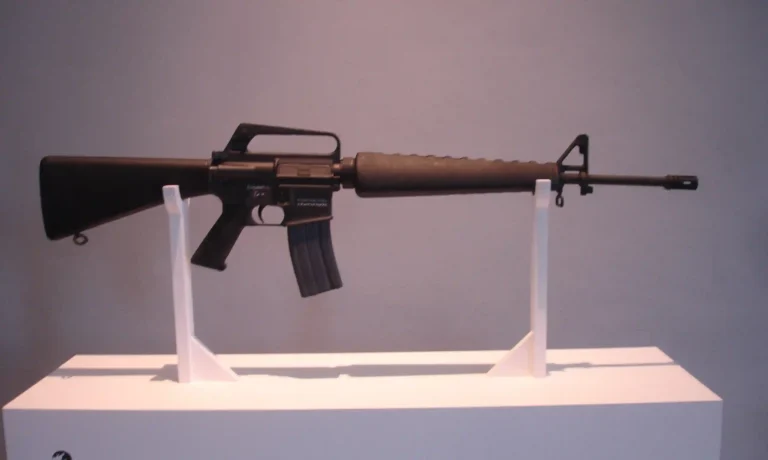Introduction
The M16 rifle is an iconic firearm with a long history of use by military and civilian shooters alike. Known for its reliability, accuracy, and versatility, the M16 is a highly sought-after weapon. However, purchasing an M16 requires careful consideration due to the various factors involved in owning such a firearm. This article will guide you through eight key things to consider before buying an M16.
- Legal Requirements and Regulations
Understanding Federal Laws
Before purchasing an M16, it’s crucial to understand the federal laws governing the ownership of such firearms. In the United States, the M16 is classified as a fully automatic weapon, which means it falls under the regulations of the National Firearms Act (NFA). Owning an M16 requires a special tax stamp, a thorough background check, and registration with the Bureau of Alcohol, Tobacco, Firearms and Explosives (ATF).
State and Local Laws
In addition to federal laws, state and local regulations may further restrict or complicate the ownership of an M16. Some states have outright bans on fully automatic weapons, while others may have additional requirements or restrictions. It’s essential to research and understand the specific laws in your area before proceeding with your purchase.
- Cost and Budget
Purchase Price
The M16 is a high-value firearm, and its purchase price reflects its capabilities and historical significance. Expect to pay a substantial amount, often ranging from $20,000 to $30,000 or more, depending on the model, condition, and provenance of the rifle.
Additional Costs
Beyond the initial purchase price, consider the additional costs associated with owning an M16 for sale. These may include:
- NFA Tax Stamp: A $200 fee required for the transfer of ownership.
- Ammunition: High-quality ammunition can be expensive, and fully automatic firearms tend to consume a lot of it quickly.
- Maintenance and Accessories: Regular maintenance, cleaning supplies, and any desired accessories (such as optics, grips, and magazines) will add to the overall cost.
- Intended Use
Purpose of Ownership
Consider why you want to own an M16. Are you a collector looking for a piece of history? Do you intend to use it for recreational shooting, competition, or self-defense? Understanding your purpose will help guide your decision-making process and ensure you choose the right model and features to meet your needs.
Practicality and Suitability
Evaluate whether an M16 is the most practical and suitable firearm for your intended use. For example, if you’re looking for a home defense weapon, a fully automatic rifle may not be the best choice due to its size, weight, and potential for over-penetration.
- Availability and Authenticity
Finding a Reputable Seller
Given the M16’s status as a regulated firearm, finding a reputable seller is crucial. Look for licensed dealers with a good reputation and positive reviews. Verify their credentials and ensure they have experience handling NFA transactions.
Verifying Authenticity
Ensure that the M16 you are purchasing is authentic and not a counterfeit or illegally modified firearm. Check the serial numbers, manufacturer markings, and any documentation that accompanies the rifle. An experienced dealer should be able to provide this information and verify the firearm’s legitimacy.
- Maintenance and Upkeep
Regular Cleaning
Maintaining an M16 requires regular cleaning and lubrication to ensure optimal performance. Fully automatic firearms can quickly accumulate residue and carbon buildup, necessitating thorough and frequent maintenance.
Parts and Repairs
Consider the availability of replacement parts and the ease of finding a qualified gunsmith to perform any necessary repairs. Given the M16’s age and specialized nature, some parts may be harder to find, and repairs may be more complex and costly.
- Safety and Training
Proper Training
Owning an M16 comes with significant responsibilities. Proper training is essential to ensure safe handling and operation of the firearm. Seek out professional training courses that cover the specific characteristics and functions of fully automatic rifles.
Safety Considerations
Ensure you have the appropriate safety measures in place, such as secure storage solutions and safety gear. Understanding the risks associated with fully automatic firearms and taking steps to mitigate those risks is crucial for responsible ownership.
- Insurance and Liability
Firearm Insurance
Given the high value of an M16, obtaining firearm insurance is a wise decision. This type of insurance can protect you against theft, damage, or loss. Look for policies that cover high-value firearms and consider the premiums as part of your overall cost of ownership.
Liability Concerns
Understand the potential liability issues associated with owning a fully automatic weapon. Accidents or misuse can have severe legal and financial repercussions. Ensure you are aware of your responsibilities as a firearm owner and take steps to mitigate any risks.
- Long-Term Commitment
Commitment to Ownership
Owning an M16 is a long-term commitment that involves ongoing costs, maintenance, and adherence to legal requirements. Assess your willingness and ability to commit to these responsibilities before making a purchase.
Potential Resale
Consider the potential resale value of the M16. While these firearms often appreciate in value, the market for fully automatic weapons can be limited. If you anticipate needing to sell the firearm in the future, ensure you understand the process and potential challenges involved.
Conclusion
Purchasing an M16 is a significant decision that requires careful consideration of various factors. From understanding legal requirements and assessing costs to ensuring proper maintenance and safety, each aspect plays a crucial role in responsible ownership. By taking the time to research and evaluate these considerations, you can make an informed decision and enjoy the benefits of owning an iconic and highly sought-after firearm.
